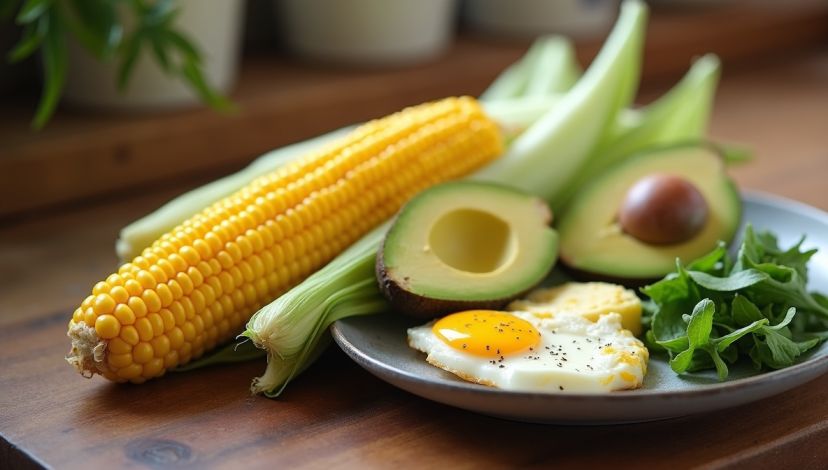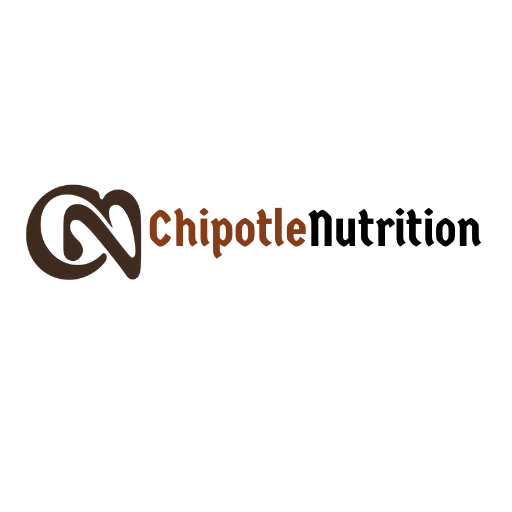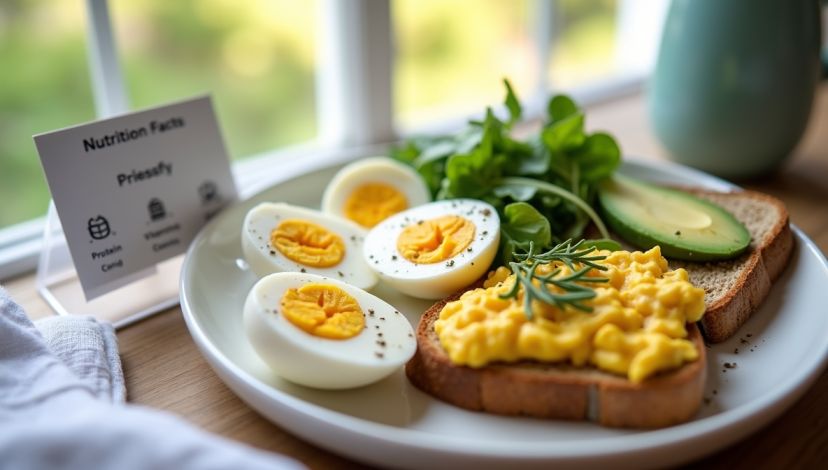Is Corn Keto Friendly? Find Out What You Need to Know

If you’re following a ketogenic diet or considering starting one, a common question you might ask is, “Is corn keto friendly?” The keto diet is based on the almost nonexistent consumption of carbohydrates as it focuses on high fat and moderate protein to drive your body towards the ketosis state i.e., fat as a main source of fuel. Corn is a common food to most people in the world as it is a staple diet, about which most people believe that it is a vegetable, but this may not be true based on the nutrition status.
Table of Contents
- So, Why Is The Corn Not Keto Friendly?
- Real-life scenario example:
- A Comparison Table: Corn vs. Keto-Friendly Vegetables
- Is it Possible to Add Corn-Based Goods to a Keto Diet?
- Expert Insight:
- Essentially, Low-Carb as an Alternative to Corn for Keto Dieters
- Environmental and Health-wise Implications of Corn on Keto
- Conclusion
- FAQs
Most people need to know whether corn is a part of a keto lifestyle or not, as eating excessive amounts of carbs will remove you out of ketosis and prevent your achievement of your weight loss or other health aspirations. There are numerous ways to use corn, namely rotten corn on the cobb, corn chips, corn syrup, etc., so it is essential to learn how corn affects your carb tallies and ketosis.
Key Takeaways:
- Corn is a starchy grain food with a lot of carbohydrates and thus unsuitable as a food in a keto diet.
- Greatly fat-adapted people sometimes eat small amounts of corn, but most keto dieters avoid it.”
- Low-carb, high-vegetables, there are wonderful alternatives to corn; following a low-carb diet helps with ketosis and meal variety.
Now, let us get technical, nutritional facts, and tips about corn and keto.
So, Why Is The Corn Not Keto Friendly?
Many people confuse corn—a starchy grain—for a vegetable, but it actually belongs to the grain family. The significance of this classification is that starchy grains possess a large number of digestible carbs, and these limits can rapidly increase and surpass the normal level of daily carbs consumed in a keto diet, that happens to be 20 to 50 grams.
- Carbohydrates: A cup or 165 grams of cooked corn has around 24 grams of net carbs (carbs – fiber), a big percentage of the regular allowance of carb intake in the keto diet13.
- Fiber vs. Carbs: As opposed to other fibers, corn contains approximately 3 grams of fiber per cup, the majority of which is digestible and is able to have an influence on the blood sugar level.
- Impact on Ketosis: Eating corn has a part in increasing the levels of blood glucose sugar and insulin, which could interfere with the process of ketosis, which is essential in the efficacy of keto.
Melanie Boehmer, M.S., who is a certified nutritionist, instructs that corn has some good nutrients, such as fiber, vitamin C, magnesium, and potassium, but since it has a high quantity of carbs, it is not a suitable food in the keto diet.
Real-life scenario example:
Many keto dieters stall their progress by accidentally consuming hidden carbs in corn-based foods like tortillas and popcorn. To give an example, one corn tortilla has approximately 20 grams of carbs, which is almost a whole day’s supply of carbs to a person on a restrictive keto diet.
A Comparison Table: Corn vs. Keto-Friendly Vegetables
This comparison shows how corn stacks up against the most popular low-carb vegetables recommended for a keto diet:
| Vegetable | Net Carbs per 1 Cup (Cooked) | Fiber (g) | Keto Suitability | Notes |
| Corn | 24 g | 3 g | Not Keto Friendly | High carb content |
| Cauliflower | 3 g | 3 g | Keto Friendly | Popular corn substitute |
| Zucchini | 4 g | 1 g | Keto Friendly | Versatile low-carb vegetable |
| Broccoli | 6 g | 2.5 g | Keto Friendly | Nutrient-rich and low-carb |
| Asparagus | 3.7 g | 2.8 g | Keto Friendly | Great for roasting or steaming |
Table Caption: The table compares the net carbs and fiber content of corn and keto-friendly vegetables, showing why most people avoid corn on a keto diet.
Note: Discussion. Then, when net carbs are low and fiber content is high, such vegetables will support ketosis and provide the necessary nutrients.
Is it Possible to Add Corn-Based Goods to a Keto Diet?
Corn doesn’t just come on the cob—it’s used in many popular foods like corn chips, syrup, popcorn, and tortillas. These processed forms often contain high levels of carbs and added sugars, making them even less suitable for a keto diet.
- Corn Chips and Tortillas: Most of them pack 15 to 20 grams of carbs per serving and can quickly drain your daily carb allowance.
- Corn Syrup: Corn syrup, a sugar-dense ingredient found in processed foods and snacks, rapidly raises blood sugar and doesn’t fit any keto diet.
- Popcorn: Popcorn comes from corn, so it belongs to the same category.. Although it has fewer carbs than other corn products, one cup of popped popcorn contains about 5 grams of net carbs, so you should enjoy it in moderation—if at all.
Expert Insight:
According to nutritionists, in order to remain in the state of ketosis, you can occasionally use corn tortillas or corn chips when you are in love with them, but the rest of the meal must be very fat, and the amount of protein should not be too high.
Essentially, Low-Carb as an Alternative to Corn for Keto Dieters
If you’re asking, “is corn keto friendly?” the answer is mostly no, but the good news is there are many delicious low-carb alternatives that mimic corn’s texture or flavor without the carb overload.
These are some of the favorites when it comes to keto-friendly substitutes:
- Cauliflower: You can use cauliflower as a low-carb, versatile alternative to rice or popcorn.
- Zucchini: great with grilling or roasting as a vegetable dish or spiralized into a noodle.
- Green Beans and Asparagus: These have crunch and calories as well as low carbs.
- Bell Peppers: Bring a sweet taste and colour with less amount of carbs as compared to corn.
| Substitute | Net Carbs per 1 Cup | Best Uses | Keto Suitability |
| Cauliflower | 3 g | Rice substitute, popcorn, mash | Excellent |
| Zucchini | 4 g | Grilled, spiralized noodles | Excellent |
| Green Beans | 4 g | Steamed, roasted side | Excellent |
| Bell Peppers | 6 g | Salads, roasting, stuffing | Good |
Vegetable alternatives to corn that are low-carb but are also ideal to follow within keto-diet rules, are mentioned in the table above.
Note: These alternatives would make your food interesting even as you keep your body on ketosis.
Environmental and Health-wise Implications of Corn on Keto
Besides carbs, there is an assessment of the overall effects of food of some proponents of the keto diet. There are environmental and health effects of corn production, and more so the genetically modified (GM) corn.
- GM: The fact that most of the corn produced in the U.S. is genetically modified would cause some jitters about the health implications in the long run and the sustainability.
- Grain Intolerance: There are cases of people being intolerant to grains and whose symptoms are bloating, fatigue, or joint pains when they take grains, including corn5.
- Processed corn foods: A lot of corn products have undergone ultra-processed food treatments and are full of additives and preservatives, which do not correspond to clean keto nutrition.
The whole foods with minimum processing is a significant idea on how to succeed in keto and health in general. This can be done by choosing fresh low-carb vegetables instead of corn.
Conclusion
So, is corn keto friendly? The obvious response is that corn does not work with a ketogenic diet because it is quite high in carbohydrates. Corn does contain a few nutrients, but due to its starchiness and carb content, it is not easy to consume it without interfering with ketosis. Processed foods containing corn are a source of additional carbs and sugars that make keto even more complicated to follow.
To loyalists of the keto, emphasizing on low-carb vegetables such as cauliflower, zucchini, and green beans tantalize you to buy tasty, healthy alternatives that facilitate ketosis and diversity in your dishes. The thing is, small portions of corn can be tolerated in people who are greatly fat-adapted, but most people do best to avoid it and keep it at a minimum.
To stick to the ketosis state and want to have tasty food, find keto-friendly alternatives, and read nutrition labels attentively. Get more information on the keto-friendly vegetables and meals in our guide Black Beans Nutrition: Benefits, Facts & Healthy Tips.
FAQs
Q1: Will I be able to eat the corn occasionally in a keto diet?
A: Small portions may slip past some fat-adapted adults, but, as a rule, corn is too carb-rich to make it an everyday keto reliable source.
Q2: Are popcorn and corn chips keto?
A: No, they are both high carb and can easily go over your daily carb limit when you eat keto.
Q3: Which vegetables can I substitute with corn on keto?
A: Good low-carb substitutes are cauliflower, zucchini, green beans, and bell peppers.
Q4: Does ketosis get affected by corn syrup?
A: It is true that all of that corn syrup is high in sugar and will stop ketosis, so it ought to be avoided.
Q5: Why is corn a grain rather than a vegetable?
A: Corn is a cereal grain botanically since it is grown out of the seeds of grasses and contains much starch as opposed to most vegetables in general.
Latest Posts
You Might Also Like

Chipotle Nutrition – Your go-to guide for calories, healthy choices, and balanced meals at Chipotle.
TOP NEWS
© Copyright 2026 Chipotle Nutrition. All rights reserved














No Comments